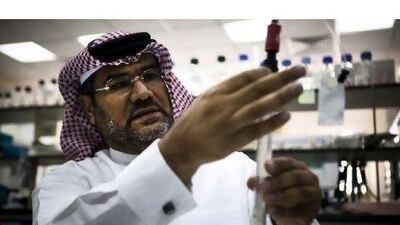AL AIN // The cancer-fighting powers of a popular Indian spice have fascinated scientists around the world for years.
Now a UAE research team is exploring the benefits of incorporating turmeric into chemotherapy, and looking for ways to use it in a potential cancer drug.
The project at UAE University's faculty of medicine and health sciences is partially funded by the Terry Fox Foundation, which organises runs in cities around the world - including yesterday's event in Abu Dhabi - to raise money for cancer research.
A lab run by Dr Sehamuddin Galadari, a professor of biochemistry and molecular cell biology at the university, will receive the final instalment of a Dh300,000 grant this year. The funds will support research on the benefits of turmeric, a shrub that is related to ginger. Ground down, it becomes a warm and peppery kitchen spice.
Turmeric has long been touted as a natural anti-inflammatory and has historically been used in health remedies in India, Indonesia, China, the Philippines and other parts of the world.
"Nature's pharmacy — the nutrients, vitamins and minerals — provides unique opportunities and improves our lives," Dr Galadari said during an interview in his lab. "It's important to remember that there is a synergy between our existence and our environment."
His team has found that curcumin, the major yellow pigment extracted from turmeric, generates enzyme activities that suppress tumors.
In cancer, the normal balance of cell growth and cell death are disrupted, leading to overgrown and damaged cells that can spread to other parts of the body. Some chemotherapy drugs induce apoptosis, or programmed cell death, to stop uncontrolled cell growth.
Dr Galadari, who is also the assistant dean for research and graduate studies at the university, is currently testing curcumin's tendency to slow growth in a variety of malignant cell lines. His previous research, published in the peer-reviewed journal Free Radical Biology & Medicinehas found that the spice could be a prime candidate for developing an anti-cancer drug.
"If the curcumin is switching off the proliferation step but also turning on a pro-death gene, it can encourage death of possible mutated or cancerous cells," he said.
Dr Galadari is also testing the possibility that curcumin might work against other treatments. The research looks at whether the powerful anti-oxidant might protect cancerous cells against stress damage caused by hydrogen peroxide, which is used in some cancer therapies.
The goal, he says, would be to use curcumin with a pharmaceutical drug.
"We must not ignore other drugs, but use them in a combinatory effect: for the curcumin to complement them, or the drugs to complement it," he said.
The project began in 2005. Funding has been critical at a time when money for UAE research is scarce, he said.
"Resources are very limited, so we rely on these much-needed philanthropic contributions for cancer research," he said. "For the sake of our country's contribution to science, the hope is that through this we will also train our young researchers and possibly discover a new drug or treatment."
The UAE's grant-making arm, the National Research Foundation, has not distributed grants it approved since it was founded in 2008, as it awaits budget approval. As a result, some institutions and universities, including UAE University, have taken the initiative to distribute funding.
The curcumin project is partially funded by the Sheikh Hamdan Award for Medical Sciences and the Emirates Foundation, an independent philanthropic organisation.
The Terry Fox Foundation says it has raised close to US$500 million (Dh1.83 billion) worldwide for cancer research. Proceeds are raised in honour of Terry Fox, a young man who, with an articial leg replacing the one he lost to cancer, embarked on a cross-Canada run to raise funds for cancer research. He died of the disease in 1981 before he could complete his journey.
Funds from the foundation's marathons are distributed to scientists in the country of origin, chosen through a competitive peer-review process.
The UAE has become one of the top supporters of the cause outside of Canada, and organisers estimate that about 65,000 people have taken part in Terry Fox events in the country since 1995.

